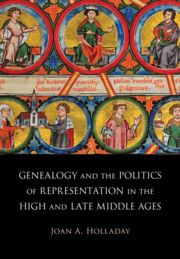(Source: CUP)
Cambridge University Press has published a
new book on image cycles with genealogical content in the high and later Middle
Ages, and the ways in which they were used to legitimize rulers.
ABOUT THE BOOK
Images and image
cycles with genealogical content were everywhere in the high and later Middle
Ages. They represent families related by blood as well as successive office
holders and appear as family trees and lineages of single figures in
manuscripts, on walls and in stained glass, and in sculpture and metalwork. Yet
art historians have hardly remarked on the frequency of these images.
Considering the physical contexts and functions of these works alongside the
goals of their patrons, this volume examines groups of figural genealogies ranging
across northern Europe and dating from the mid-twelfth to the mid-fourteenth
century. Joan A. Holladay considers how they were used to legitimize rulers and
support their political and territorial goals, to reinforce archbishops' rights
to crown kings, to cement relationships between families of founders and their
monastic foundations, and to commemorate the dead. The flexibility and
legibility of this genre was key to its widespread use.
ABOUT THE AUTHOR
Joan A.
Holladay, University of Texas, Austin
Joan A. Holladay
is Professor of Art History at the University of Texas, Austin. Author of
Illuminating the Epic: The Kassel Willehalm Codex and the Landgraves of Hesse
in the Early Fourteenth Century (1997) and Co-Editor of Gothic Sculpture in
America, volume 3 (2016), she has held positions as Visiting Senior Fellow at
Center for Advanced Study in the Visual Arts (CASVA), National Gallery of Art;
Hohenberg Chair of Excellence, University of Memphis; and NEH Professor of the
Humanities, Colgate University. In 2008, she received the Distinguished
Teaching Award of the University of Texas's College of Fine Arts.
TABLE OF CONTENTS
1. Rivalling/reviving Rome: environmental
genealogies in palace halls
2. Structuring the past: history and
genealogy in thirteenth-century England
3. Crowning the king: coronation rights at
Cologne and Reims
4. Advertizing allegiances: tombs and tomb
cycles
5. Flattering founders: genealogical
imagery in cloister chronicles.
More information here


No comments:
Post a Comment
Note: Only a member of this blog may post a comment.